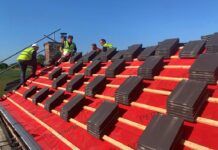The government’s housing ambitions cannot only rely upon volume housebuilders, says ‘Housing Diversification’, a new action group, which is made up of the Federation of Master Builders, the UK Cohousing Network, the National Community Land Trust Network, and the National Custom and Self Build Association.
The group is calling on the government to deliver on its commitment to support a much wider range of routes to housing development, and to boost the number of small-to-medium (SME) housebuilders who deliver them.
It is proposing that a new, high-level Housing Diversification Taskforce be created to support greater housing diversity. This is crucial, as currently, volume housebuilders and the housing association sector deliver the majority of England’s housing, and yet together they are not able to deliver on the government’s ambitions for 300,000 homes per year.
The number of SME housebuilders halved following the last recession, and we must avoid a repeat of this as we scale up housing delivery in 2021. Currently, the SME sector, comprising small housebuilders, community led housing and custom and self- build, is delivering a minimum of 20,000 homes annually, but it has the potential to deliver significantly more housing – up to 130,000 extra homes by 2025*.
These homes are sustainable, beautiful, innovative, of high quality, support local economies and provide training and employment.
Diversifying the housing market is a core pillar of the government’s housing policy, but to ensure we ‘Build Back Better’, it must be a core part of a wider strategy for recovery from COVID-19. To ensure the government delivers on its pledges, Housing Diversification is calling for:
- The establishment of a high-level Housing Diversification Taskforce, with a range of items set out for consideration (see Appendix).
- Commitment to a five-year renewal of the Community Housing Fund as part of the Comprehensive Spending Review.
- The creation of a robust and statutory system of reporting on diversification as part of the government housing statistics, including on the NPPF requirement for 10% of homes to be delivered on small sites (one hectare or less).
Andrew Baddeley-Chappell, chief executive officer of the National Custom and Self Build Association and spokesperson for the group, said: “Despite the importance of houses to our lives and the scale of their cost, there is currently too little choice when it comes to new homes in this country.
“We have come together as Housing Diversification to deliver more passion, quality, and care into the new homes and the new communities that we, as a nation, need to be creating. Just like any other market, increasing diversification will improve quality, innovation, and value. We will deliver homes more people want to live in and that more welcome being built.”
Focus areas to secure growth
Housing Diversification is calling for a Taskforce to consider the following issues:
- Invest in local authority planning departments to help them make determinations quicker and address the bottleneck created by lockdown.
- Address loopholes in the Right to Build legislation and how activity is reported.
- Deliver on the government’s commitment to extend Help to Buy (or introduce a new loan scheme) to custom and self-build to address the current unfair competition.
- Create a strategy for Homes England that supports diversification, including ensuring it is embedded and actively encouraged through the upcoming DPP3 process.
- Require Homes England to adopt a policy whereby 10% of homes that are delivered as a result of their investment or land disposals are built on sites of no more than one hectare.
- Explore the scope for local authorities to routinely set up developer forums that bring together a range of views (planning officers; SME housebuilders; community representatives) to assess housing demand and strategies to meet this.
*Size of the respective markets:
- The Federation of Master Builders (FMB) represents 7,500 SME firms across the UK, half of which build new homes. FMB members expect to build more than 12,000 new homes in 2021.
- The National Custom and Self Build Association reports that custom and self-build delivers 14,000 homes annually – with full support this could be 73,500 by 2025.
- There are 10,780 community led homes in ‘live applications’ on Homes England system awaiting delivery, part of a wider pipeline of 23,000 homes. (Source: http://www.communitylandtrusts.org.uk/_filecache/387/a2e/905-clh-
pipeline-analisys-dr-tom-archer-feb-2020.pdf).
Many of the live projects are reliant on the Community Housing Fund 5-year renewal. - The figure of 130,000 extra homes by 2025 is made up of an extra 73,500 custom and self-build homes and half (see note below) of the potential 65,000 homes that could be delivered by SMEs, were the sector to return to delivering 40% of all new homes, as it did in the 1980s. Finally, the 23,000 community led homes figure is added to this total to reach 129,000 homes, rounded up to 130,000.
A note on counting: Roughly 50% of SME housebuilder output is custom or self-build, so the 20,000 figure represents 14,000 custom and self-build homes and half the annual FMB delivery figure of 12,000 homes to prevent double counting. Community led homes are, therefore, in addition to this figure.




